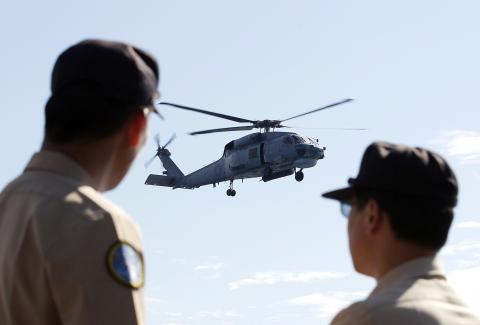President Ma Ying-jeou (馬英九) yesterday defended the legality of the government’s sanctions against Manila over the killing of a Taiwanese fisherman last week, appealing for international condemnation of what he called outrageous behavior by the Philippines.
Speaking at a forum on international law and disputes organized by the Chinese (Taiwan) Society of International Law, Ma said the Philippine government vessel’s “excessive use of force” against a Taiwanese fishing boat in the two nations’ overlapping exclusive economic zones violated both international law and the UN Convention on the Law of the Sea.
“We believe such outrageous behavior cannot be tolerated by the international community,” he said.

Photo: Pichi Chuang, Reuters
The Taiwanese boat was fired upon by a joint patrol of the Philippine Coast Guard and the Bureau of Fisheries and Aquatic Resources on Thursday last week in waters where the exclusive economic zones of Taiwan and the Philippines overlap, resulting in the death of 65-year-old fisherman Hung Shih-cheng (洪石成).
The Ma administration on Sunday demanded that the Philippine government apologize for the killing, compensate Hung’s family, launch a full investigation into the incident and start negotiations on a fisheries agreement.
Ma yesterday said the government issued the four demands in accordance with international law, adding that 11 punitive measures were implemented on Wednesday because the Philippine government had failed to meet the demands by Taipei’s deadline.

Photo: Sam Yeh, AFP
“I do hope [the Philippine government] will understand they have to be a responsible stakeholder in the international community. Killing unarmed innocent people on the open seas is not an act tolerated by civilized nations,” he said.
The government announced on Wednesday it had suspended Philippine worker applications, recalled Taiwan’s representative to the Philippines and asked the Philippine representative to Taiwan to return to Manila.
The eight other sanctions are a travel warning that discourages Taiwanese from visiting the Philippines, the suspension of high-level meetings at the World Health Assembly, the suspension of economic exchanges, the suspension of cooperation on agriculture and fisheries, the suspension of cooperation on technology, the suspension of negotiations on air space rights, the suspension of the visa-free program for Philippine nationals and that Taiwan would hold military exercises in disputed waters.
While condemning the Philippine government for its irresponsible handling of the incident, Ma also called on Taiwanese to treat Philippine workers and visitors rationally and in a friendly manner.
“Philippine workers work as hard as Taiwanese … I ask all Taiwanese to judge the matter as it stands and not to vent their anger on Philippine nationals living in Taiwan,” he said later on his Facebook page.

DAREDEVIL: Honnold said it had always been a dream of his to climb Taipei 101, while a Netflix producer said the skyscraper was ‘a real icon of this country’ US climber Alex Honnold yesterday took on Taiwan’s tallest building, becoming the first person to scale Taipei 101 without a rope, harness or safety net. Hundreds of spectators gathered at the base of the 101-story skyscraper to watch Honnold, 40, embark on his daredevil feat, which was also broadcast live on Netflix. Dressed in a red T-shirt and yellow custom-made climbing shoes, Honnold swiftly moved up the southeast face of the glass and steel building. At one point, he stepped onto a platform midway up to wave down at fans and onlookers who were taking photos. People watching from inside

A Vietnamese migrant worker yesterday won NT$12 million (US$379,627) on a Lunar New Year scratch card in Kaohsiung as part of Taiwan Lottery Co’s (台灣彩券) “NT$12 Million Grand Fortune” (1200萬大吉利) game. The man was the first top-prize winner of the new game launched on Jan. 6 to mark the Lunar New Year. Three Vietnamese migrant workers visited a Taiwan Lottery shop on Xinyue Street in Kaohsiung’s Gangshan District (崗山), a store representative said. The player bought multiple tickets and, after winning nothing, held the final lottery ticket in one hand and rubbed the store’s statue of the Maitreya Buddha’s belly with the other,

‘NATO-PLUS’: ‘Our strategic partners in the Indo-Pacific are facing increasing aggression by the Chinese Communist Party,’ US Representative Rob Wittman said The US House of Representatives on Monday released its version of the Consolidated Appropriations Act, which includes US$1.15 billion to support security cooperation with Taiwan. The omnibus act, covering US$1.2 trillion of spending, allocates US$1 billion for the Taiwan Security Cooperation Initiative, as well as US$150 million for the replacement of defense articles and reimbursement of defense services provided to Taiwan. The fund allocations were based on the US National Defense Authorization Act for fiscal 2026 that was passed by the US Congress last month and authorized up to US$1 billion to the US Defense Security Cooperation Agency in support of the

HIGH-TECH DEAL: Chipmakers that expand in the US would be able to import up to 2.5 times their new capacity with no extra tariffs during an approved construction period Taiwan aims to build a “democratic” high-tech supply chain with the US and form a strategic artificial intelligence (AI) partnership under the new tariffs deal it sealed with Washington last week, Taipei’s top negotiator in the talks said yesterday. US President Donald Trump has pushed Taiwan, a major producer of semiconductors which runs a large trade surplus with the US, to invest more in the US, specifically in chips that power AI. Under the terms of the long-negotiated deal, chipmakers such as Taiwan Semiconductor Manufacturing Co (TSMC, 台積電) that expand US production would incur a lower tariff on semiconductors or related manufacturing